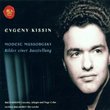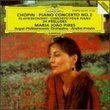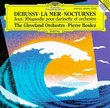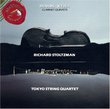| All Artists: Arcadi Volodos, Franz Schubert Title: Schubert: Solo Piano Works Members Wishing: 0 Total Copies: 0 Label: Sony Original Release Date: 1/1/2002 Re-Release Date: 2/12/2002 Genres: Pop, Classical Styles: Vocal Pop, Chamber Music, Forms & Genres, Sonatas, Historical Periods, Classical (c.1770-1830) Number of Discs: 1 SwapaCD Credits: 1 UPC: 696998964723 |
Search - Arcadi Volodos, Franz Schubert :: Schubert: Solo Piano Works
 | Arcadi Volodos, Franz Schubert Schubert: Solo Piano Works Genres: Pop, Classical
Arcadi Volodos's reputation has been based on fire-eating virtuoso material, but he brings wit, poetry, and depth to this unexpected but very welcome foray into Schubert. All three attributes are prominently displayed in S... more » |
Larger Image |
CD DetailsSynopsis
Amazon.com Arcadi Volodos's reputation has been based on fire-eating virtuoso material, but he brings wit, poetry, and depth to this unexpected but very welcome foray into Schubert. All three attributes are prominently displayed in Schubert's first, unfinished Piano Sonata, on which Volodos plays the first movement melody with disarming lyricism and sets it off against the bolder, Beethovenian contrasting passages, which are done with a big, full-bodied tone and slashing accents. A highlight is the gently sung andante movement. The main work is the big G Major Sonata, a mature masterpiece. Volodos floats the opening, its tentative measured tread apparently materializing out of thin air--a nice touch. When Schubert morphs that strange melodic fragment into a theme poised between hesitant withdrawal and urgent poetry, Volodos responds with tremendous feeling. He's as effective in the jagged, stabbing forte restatement of the theme, varying tonal color and dynamics to great effect. The encorelike filler, Liszt's arrangement of Schubert's song Der Müller und der Bach, is done with flowing grace. Throughout, Volodos brings personal touches to these works that clearly reflect his affection for Schubert's great keyboard works. --Dan Davis Similarly Requested CDs
|
CD ReviewsArcady Volodos, plus Franz Schubert = HIGHest recommend Dan Fee | Berkeley, CA USA | 09/16/2002 (5 out of 5 stars) "When Mr. Volodos dared to play Schubert sonatas as the centerpiece of his recital in San Francisco at Davies Hall last year, I glanced over the program with some apprehension. Schubert is cherished for his lied, damned with faint praise for his piano sontas and symphonies. In the last few decades, however, critical and popular opinion of the instrumental music has been slowly changing for the better. Mr. Volodos' advocacy is most welcome, at this perihelion. As it happens, on the occasion of that recital, Mr. Volodos' playing of Schubert was a revelation and a musical awakening. You see, Schubert piano music is incredibly difficult to play on the modern grand piano, without all those repeated notes, repeated figurations, even repeated chords, sounding hapless and wrong-headed. In a word, clunky. The lyric genius that is Schubert gets lost in the banging. Once the lyric heart of song has departed the recital hall's premises, forget gaining any insights into the harmony and musical innovation that, modern commentaries have begun to assure us, are here. Serenely and wittily applying his own olympian technique to the sonatas, Mr. Volodos makes the best possible contemporary case for Schubert, and for the modern grand piano at the same time. He uses all that wizardry, heretofore applied to Lisztian innovation and athletic display, to simply sing what Schubert wrote. Suddenly, these sonatas by the great lied composer sound like equally worthy companions to the Beethoven piano sonatas, albeit very different, full of musical coherence and uniquely Schubertian sung drama that gathers reflective depth and unique lyrical sweetness into collateral harmonies that sound overlong, played by others. Given the manner in which Mr. Volodos performs these sonatas, we may at last breathe a sigh of collective relief. Schubert did achieve the compelling theater he so tirelessly sought in his failed works for the stage, in these very sonatas. Thoroughly converted to Schubert, and to Mr. Volodos, by the end of the evening, I switched to lamenting to friends that the market-driven realities would would probably preclude Sony Classics from ever allowing their athletic wonder-boy to record the Schubert sonatas we had just heard. Fortunately, I was wrong. Here they are. If you have ever wondered what dear old Franz could have been thinking when he bothered to write so many sonatas for the pianoforte, here is your modern answer. More than others, including Brendel, Uchida, and quite a long list of other deservedly-famous names, Mr. Volodos wins the day for himself and for Franz Schubert in these recordings. Every note is placed, voiced, unerringly, in relation to the overall musical narrative. Franz Schubert is sounding like a very cool customer, the way Mr. Volodos plays him. In fact, now I am worrying myself that Mr. Volodos probably will be shuffled quickly again into other repertoire, when in fact, he should be encouraged to finish the rest of the Schubert piano sonatas. When I want to stop worrying about all this, I just play the CD again, and thank my lucky stars I was alive to hear this one. So far, this is the best, the very best Schubert playing, ever. Perhaps you owe it to yourself, to let Mr. Volodos convince you, too." Thoroughly modern Schubert Norman Duffy | Amsterdam | 11/28/2002 (5 out of 5 stars) "This young pianist, Russian born resident in Spain, has enjoyed phenomenal success in a relatively brief time span. A starburst debut saw him performing the most outrageous series of transcriptions, including his own "transcribed" transcriptions written and performed by Horowitz, which most of us thought had died with the late Vladimir. Volodos' technique is the genuine article; pinpoint precision, superb warm sound, wonderfully rock solid musical instinct, tremendous power, pearly pianissimi, and a natural sense of rhythm.That was super but it was a studio recording. It was followed by Rachmaninov's third concerto which showed the same technical resources but wasn't quite the world beater we might have expected, although it is a fine performance. Divine Schumann followed in a live recording of his debut in Carnegie Hall. That was surrounded by further majestic recordings of the Russian romantic tradition, Rachmaninov and Scriabin as well as more of his Horowitz transcriptions.And now....this!! Anyone taking on these Schubert sonatas is brave indeed. The sheer intellect required to tame those enormous musical passages and to unravel the seemingly endless and, in some hands, repetitive phrases, is immense. There have been revelatory readings of these magnificent works from Richter, Brendel and others, Richter in particular was excrutiatingly intense in the opening movement of the G major work. Check out the snipets of his performance on the Richter the Enigma, the excellent documentary by Bruno Monsaignon.As far as I am concerned, Volodos tops them all with some miraculous piano playing that this time confirms his claim to greatness. As piano playing purely, it is wonderful in itself. This man's innate musicality is aligned to one of the most flexible and fluid techniques ever. That technique is placed entirely at the service of the music and one is thoroughly absorbed by the massive structures not bewildered by them. All is laid bare with a translucency that is never clinical or sanitised.Every movement unfolds in a way that makes you realise once again or for the first time that Schubert's lyrical inventiveness was not just to be found in his songs. For many, I can imagine that this disc will be revelation in terms of being introduced to Schubert's major piano works. The G major is on a par with the last three great sonatas written in the year of his untimely death. Next stop from here is surely those last three. The opening of the G major sonata is one of the most haunting moments in music and Volodos conveys the space around the music and allows the music to breath naturally.The sonatas are obviously the main issue here, but the Liszt arrangement is also superb. The sureness of Volodos' touch and the perfection of his conrol of musical line and part playing within all of the muscal textures is simply fabulous and again never self-serving or idiosyncratic.Top recommendation from me. The sound is top drawer Sony." Astounding pianism. e j powell | Hong Kong | 06/16/2002 (5 out of 5 stars) "I do not understand how I can have spent the first forty years of my line with Schubert Lieder as my first choice in all music, but with hardly a suspicion that the Piano Sonatas are also towering masterpieces of the romantic literature. Now I'm making up for lost time. Yes, of course, Kampf for a definitive statement. Yes, Richter, for a deeply intimate interpretation. Yes, Schiff, for his sensitivity, even though he is a little up-tight for me. And let's all be grateful for the extraordinary recordings of Ukido - wonderful. But then along comes Volodos, previously only known to me for those completely over the top transcriptions in his Cranegie Hall album. What would he make of Schubert's intimacy, delicacy, privacy and sincerity? the answer is: a great deal. Make no mistake, this recording is a magical experience - Volodos places his very considerable pianistic skills in the service of the great Master. It is amazing how he achieves gradations of tone and volume - but never merely (it seems to me) for the sake of it. Always in the service of the music. And in the Liszt, he achieves extraordinary 'bel canto' -- unbroken lines of pure leagto - with aching lyricism. If I have a criticism to make, it is perhaps that I spent a fair amount of listening time listening to Volodos' skill, rather than the music. There are so many magical effect, that I started to loose sight of the architecture of these huge blocks of composition... the first movement of the G major sonata alone is almost 20 minutes long.I hope the loyal fans of Volodos will buy this disc and be led from an appreciation of his sheer virtuosity and technique to wonder at his grasp of intimacy and his respect for Schubert. I hope that fans of schubert's piano sonatas will buy this disc and share with me a gratitude for a new star in the firmament."
|

 Track Listings (8) - Disc #1
Track Listings (8) - Disc #1








